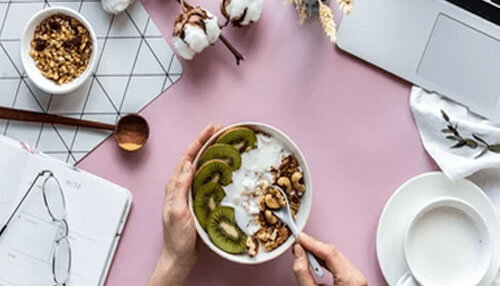Choosing healthy food to eat at the workplace or giving healthy eating tips to office workers is the best recommendation. Even choosing Reusibly.com which includes reusable bamboo toothbrushes, eco-packages, etc., is a way of living. Staying eco-friendly and eat healthy at work ensures a peaceful life.
Tips to eat healthy at work
Spending a lot of time at the workplace is not surprising. However, what you drink and eat affects your overall health. The practical tips to eat healthy at work are as follows:
1. Pack lunch
Planning lunch ahead offers a nutritious meal and prevents settling for options available in the workplace cafeteria. In this way, you can keep away from reaching some nearby fast-food restaurants.
2. Keep candy bowls away
Snacking with each day adds additional calories. You will not realize how many you are eating, and it is hard to stop. Thus, store the candy bowls away from your eyesight.
3. Snack smart
The work-from-home culture develops to more snacking. You need not avoid it completely, but eat a few healthy snacks. Eat nuts, dried fruits, vegetables, protein bars, and fat-free yogurt.
4. Keep a water bottle nearby
Eating is not only about the food to consume; it includes the beverages, as well. It is easy to forget to drink water while you are busy. Having a bottle visible is a reminder to drink and to stay hydrated.
5. Avoid fancy coffee
The workplace culture runs along with coffee or tea. Taking these coffees in small doses may not appear to be a big deal. However, when it includes honey, syrups, whole milk, and cream, unknowingly, it adds extra calories.
6. Schedule lunch
Relying on snacks, skipping meals is common. Breaking the cycle is essential. When you have lunch, your mind is clear to take ahead challenges. You also feel energized.
7. Rethink before drinking
Drinking beverages with added fat, sugar, and calories is not a healthy option. It is a must to be mindful of the drinks you consume. Avoid sugary beverages.
More facts that are best to follow
Breakfast advice
Never skip breakfast. It adds to weight gain and increases the risks of high blood pressure, heart disease, atherosclerosis, obesity, diabetes, and high cholesterol. The first meal is the breakfast in a day, and it is the one encouraging your body to burn calories. Breakfast is a must so that the cortisol levels that rise high in the morning do not rise. Cortisol in high levels can make you feel jittery or anxious.
- Avoid sugary foods. It is because once you begin eating sugar, you will rush all day for sugary foods.
- Load up at breakfast on protein to kickstart metabolism. Eating protein will keep you going for longer hours, and you will not feel tempted to snack.
Don’t skip meals
Eating properly with the right nutrients is important. Learn more, you cannot afford to skip meals or maintain a long gap between healthy snacking. The long hours will push your glucose down, making concentration harder. Besides, skipping meals will result in eating wrong things or overeating in the next meal. Meal planning is one of the best ways to stay on top of your weight loss goals. WIO offers customized meal plans for your weight loss goals.
Negative effect on skipping meals:
- You overeat.
- You gain more weight
- Energy and blood sugar declines affecting concentration
- Negative impact on mood
More veggies, more health
There are many different types of vegetables, so mix and match to create a variety of flavors and colors in your meals. You can enjoy them cooked or raw, and they are a great addition to both breakfast and lunch.
Some of the health benefits of eating vegetables include:
- Improved cardiovascular health
- Reduced risk of cancer
- Reduced risk of type 2 diabetes
- Improved digestion
- Weight loss and management
- Improved mental function, mood, and concentration
- Healthier skin
Lunch advice
Healthy lunch is most important. An ideal lunch is one with the right balance of sugars, protein, fiber, fat, carbohydrates, and nutrients. Ensuring a healthy lunch requires planning.
- Prepare lunch at home.
- Do not eat lunch at your desk.
- Find a lunch buddy so that you enjoy company while eating.
- If you are eating outside, find healthy eating options close to your office.



